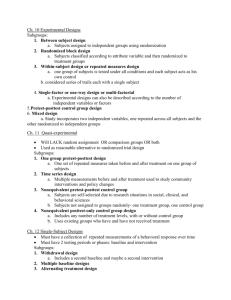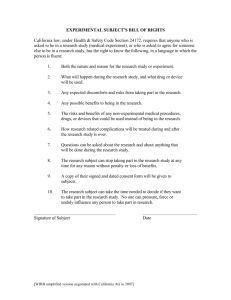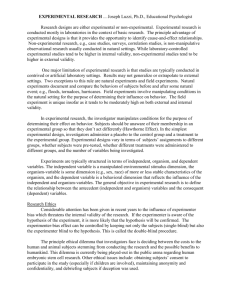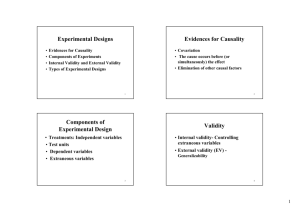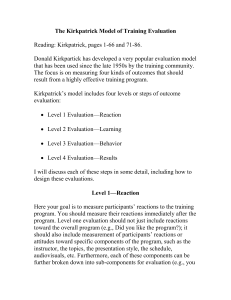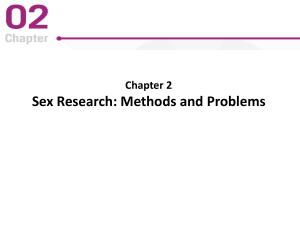Quasi-experimental designs
advertisement
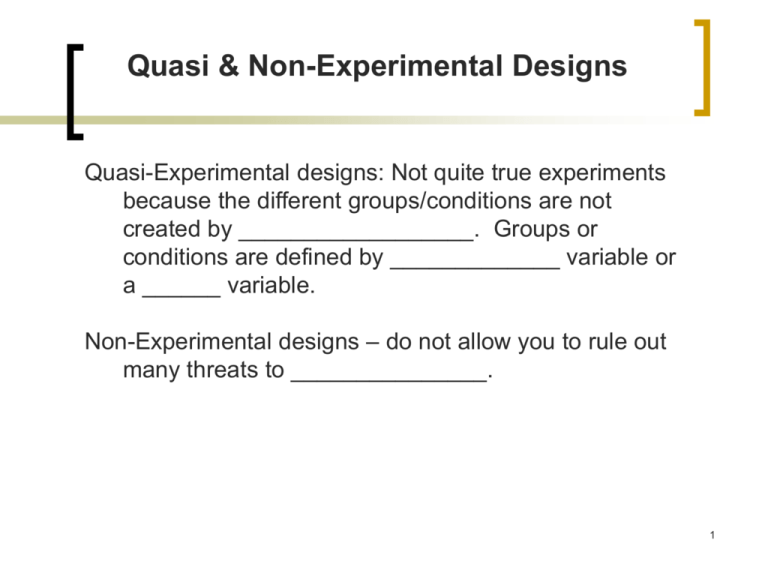
Quasi & Non-Experimental Designs Quasi-Experimental designs: Not quite true experiments because the different groups/conditions are not created by __________________. Groups or conditions are defined by _____________ variable or a ______ variable. Non-Experimental designs – do not allow you to rule out many threats to _______________. 1 Quasi & Non-Experimental Designs Those using ____ group, compare behavior across _____: • Time-series designs (quasi-experimental) • One group pretest-posttest (non-experimental) • Longitudinal design (non-experimental Those using multiple, ____________ groups: 1. Pretest-posttest nonequivalent control group design (quasi-experimental) 2. Posttest-only control group design (Static-group design) (non-experimental) 3. Differential (Causal-comparative) design (nonexperimental) 4. Cross-sectional design (non-experimental) 2 Summary of Quasi & Non-experimental designs QUASIEXPERIMENTAL NON-EXPERIMENTAL Time-series design (One group) Differential/Causal comparative design (Multiple groups) Pretest-posttest non-equivalent control-group design (Multiple groups) Developmental: Cross Sectional design (Multiple groups) Developmental: Longitudinal design (One group) One-group pretest-posttest design (One group) Posttest-only nonequivalent group (Static) design (Multiple groups) When would you use a quasiexperimental design? When you want to investigate a relationship but cannot create ________ assign groups It is not _________ to create randomly assigned groups 4 Pretest-Posttest Non-Equivalent Control-Group Design Pretest-Posttest Nonequivalent ControlGroup Design Definition: A quasi-experimental design in which behavior in two _______________groups is measured pre and post-IV No random __________ and ___________ Because you measure behavior before treatment you can evaluate group equivalence - it reduces the threat of _______________ e.g., Effects of Flexible vs. fixed work hours on productivity in two factories e.g., Effects of Home-based vs. School-based treatment on problem behavior 6 Posttest Only (Static) Group Design 7 Posttest Only (Static) Group Design No random selection and assignment 2 __________________, e.g., children in 2 clinics Groups should be ______ Susceptible to internal validity threats, e.g., assignment bias (selection threat) - group assignment is _______ Example: effects of peer tutoring in two classrooms 8 Time-Series Design Definition: A quasi experimental design in which behavior in one group of participants is measured across time _______________ an IV is implemented. ___________________ control for multiple threats to internal validity Allows you to evaluate _________ across time Called ___________________ when the IV is not created by the experimenter Called a time series design with _______________if the treatment is repeatedly presented across multiple groups. 9 Intact Group of Participants Measurement of DV Measurement of DV Measurement of DV ____________ Design Experimental Condition Measurement of DV Measurement of DV 10 Time-Series Design 45 40 Smoking Frequency Smoking Frequency Example: Effects of anti-smoking campaign on smoking frequency 35 30 25 20 15 10 5 0 Before Campaign 35 30 25 20 15 10 5 0 After Campaign No ______ group – hard to tell if campaign was effective 45 40 Intervention Time Series – Effect was just part of periodic ____________ Smoking Frequency Smoking Frequency 45 40 35 30 25 20 15 10 5 0 Intervention Time Series – Effect was just part of downward ________ 45 40 35 30 25 20 15 10 5 0 Intervention Time Series – Effect occurs only after ____________ 11 Developmental Research Designs – study age-related changes in behavior Group at Time 1 (e.g., 10 yrs) Group at Time 1 (e.g., 20 yrs) Group at Time 1 (e.g., 40 yrs) Longitudinal design Measuring a variable in individuals over an ___________________ Like a time-series design with no _______________ Can determine how an individual _________ No cohort effects Very _____________, expensive Problems with _____, ________ 12 One-Group Pretest-Posttest Design 1 naturally occurring group Pretest and postest 13 One Group Pretest-Posttest Design Observation made in ____ group before and after treatment No attempt is made to control for many threats to ________________ 14
